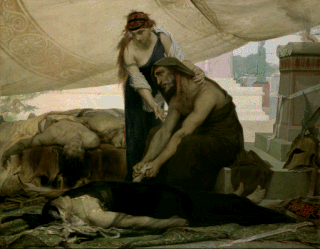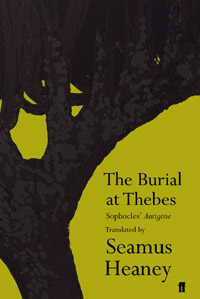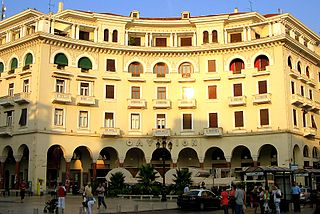
Sophocles is one of three ancient Greek tragedians whose plays have survived. His first plays were written later than or contemporary with those of Aeschylus, and earlier than or contemporary with those of Euripides. Sophocles wrote over 120 plays during the course of his life, but only seven have survived in a complete form: Ajax, Antigone, Women of Trachis, Oedipus Rex, Electra, Philoctetes and Oedipus at Colonus. For almost 50 years, Sophocles was the most celebrated playwright in the dramatic competitions of the city-state of Athens that took place during the religious festivals of the Lenaea and the Dionysia. He competed in 30 competitions, won 24, and was never judged lower than second place. Aeschylus won 13 competitions, and was sometimes defeated by Sophocles, while Euripides won four competitions.

In Greek mythology, Antigone is the daughter of Oedipus and his mother Jocasta. The meaning of the name is, as in the case of the masculine equivalent Antigonus, "worthy of one's parents" or "in place of one's parents".

Antigone is a tragedy by Sophocles written in or before 441 BC.

Oedipus was a mythical Greek king of Thebes. A tragic hero in Greek mythology, Oedipus accidentally fulfilled a prophecy that he would end up killing his father and marrying his mother, thereby bringing disaster to his city and family.

In Greek mythology, Polynices was the son of Oedipus and Jocasta and the younger brother of Eteocles. When his father, Oedipus, was discovered to have killed his father and married his mother, he was expelled from Thebes, leaving his sons Eteocles and Polynices to rule. Because of a curse put on them by their father Oedipus, the two sons did not share the rule peacefully and died as a result, killing each other in battle for control over Thebes.
According to Sophocles' play Antigone, Haemon or Haimon, was the mythological son of Creon and Eurydice, and thus, brother of Menoeceus (Megareus), Lycomedes, Megara, Pyrrha and Henioche.
Creon, is a figure in Greek mythology best known as the ruler of Thebes in the legend of Oedipus. He had four sons and three daughters with his wife, Eurydice : Henioche, Pyrrha, Megareus, Lycomedes and Haimon. Creon and his sister, Jocasta, were descendants of Cadmus and of the Spartoi. He is sometimes considered to be the same person who purified Amphitryon of the murder of his uncle Electryon and father of Megara, first wife of Heracles.

Ismene is the name of the daughter and half-sister of Oedipus, daughter and granddaughter of Jocasta, and sister of Antigone, Eteocles, and Polynices. She appears in several plays of Sophocles: at the end of Oedipus Rex, in Oedipus at Colonus and in Antigone. She also appears at the end of Aeschylus' Seven Against Thebes.

Oedipus Rex, also known by its Greek title, Oedipus Tyrannus, or Oedipus the King, is an Athenian tragedy by Sophocles that was first performed around 429 BC. Originally, to the ancient Greeks, the title was simply Oedipus (Οἰδίπους), as it is referred to by Aristotle in the Poetics. It is thought to have been renamed Oedipus Tyrannus to distinguish it from another of Sophocles' plays, Oedipus at Colonus. In antiquity, the term “tyrant” referred to a ruler, but it did not necessarily have a negative connotation.

Oedipus at Colonus is one of the three Theban plays of the Athenian tragedian Sophocles. It was written shortly before Sophocles' death in 406 BC and produced by his grandson at the Festival of Dionysus in 401 BC.
James Evander Munro Yuill is a Scottish actor.

The Phoenician Women is a tragedy by Euripides, based on the same story as Aeschylus' play Seven Against Thebes. The title refers to the Greek chorus, which is composed of Phoenician women on their way to Delphi who are trapped in Thebes by the war. Unlike some of Euripides' other plays, the chorus does not play a significant role in the plot, but represents the innocent and neutral people who very often are found in the middle of war situations. Patriotism is a significant theme in the story, as Polynices talks a great deal about his love for the city of Thebes but has brought an army to destroy it; Creon is also forced to make a choice between saving the city and saving the life of his son.

The Burial at Thebes: A version of Sophocles' Antigone is a play by Irish Nobel laureate Seamus Heaney, based on the fifth century BC tragedy Antigone by Sophocles. It is also an opera by Dominique Le Gendre
George Tzavellas, also rendered Giorgos Tzavellas, Yiorgos Tzavellas, or Yorgos Javellas, was a Greek film director, screenwriter, and playwright. His filmmaking was particularly influential, with critic Georges Sadoul considering him "one of the three major postwar Greek directors".
In Greek mythology, Eurydice sometimes called Henioche, was the wife of Creon, a king of Thebes.

Antigona (Antigone) is an opera in three acts in Italian by the composer Tommaso Traetta. The libretto, by Marco Coltellini, is based on the tragedy Antigone by Sophocles. But there is also an opera Antigona by Josef Mysliveček.
In Greek mythology, Megareus or Menoeceus (Μενοικεύς) was a warrior of Thebes, who figures in the war of the Seven Against Thebes - the struggle between Eteocles and Polynices, the twin sons of Oedipus, for the throne of Thebes. He was known for his large stature, and is considered an anthropomorphic representation of his father's pride by some literary scholars.
In Greek mythology, the name Maeon or Maion may refer to:

Antigone is a play by the Attic dramatist Euripides, which is now lost except for a number of fragments. According to Aristophanes of Byzantium, the plot was similar to that of Sophocles' play Antigone, with three differences. The date of the play is uncertain, but there is evidence that it was written late in Euripides' career, between 420 BCE and 406 BCE.















